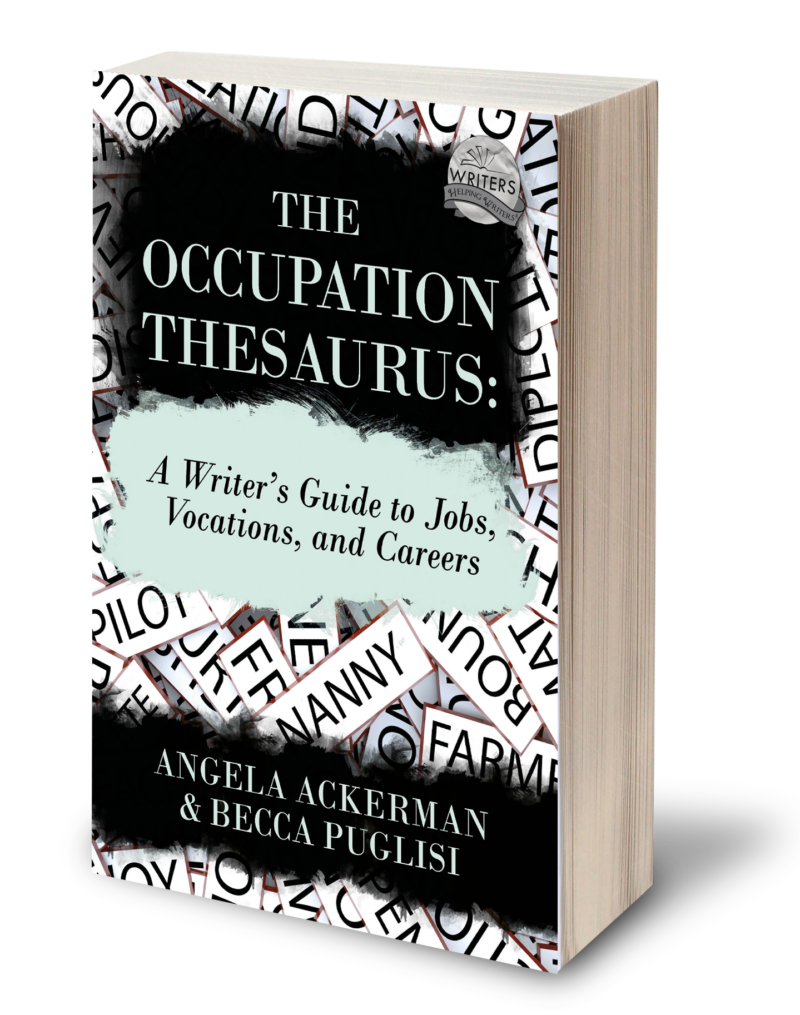Realistic Character Occupations: My Experience as an Office Temp
To win readers over, we need to write characters so authentic they feel like real people. How do we do this? By brainstorming a character’s backstory, personality, needs, desires, and their day-to-day world. Lucky for us, one aspect of their daily life is a goldmine of characterization: the type of work they do.
Think about it: A job can reveal personality, skills, beliefs, fears, desires, and more, which is why Angela Ackerman and Becca Puglisi created The Occupation Thesaurus, a writing guide that profiles 124 possible careers and the story-worthy information that goes with each. To help with this project, I’m sharing my experience as an Office Temp below, in case this career is a perfect fit for your character!
You can find the full list of Contributed Occupation Profiles and check out The Occupation Thesaurus: A Writer’s Guide to Jobs, Vocations, and Careers at Writers Helping Writers.
OCCUPATION: Office Temp
OVERVIEW

As a temporary office staffer, I was assigned by my various temporary agencies to work at companies that were understaffed, such as when one of their permanent employees took time off or when the company was kicking off a new project. Each assignment came with different expectations as far as skills, responsibilities, and how to fit into the specific company culture.
I sometimes had a high-paying assignment for two days at one company, followed by a lower-paying assignment for two months at another company, and then a dry spell of no assignments—and no paycheck. Despite that uncertainty, I loved the variety and insights into many different industries. In addition, the flexibility was a great fit during my college years, and in the tight after-college years, I appreciated the ease of getting non-retail work experience (especially as one of my “temporary” assignments lasted four years!).
NECESSARY TRAINING
Like with all office temps, my employer was the temporary agency (not the company I was assigned to), and different agencies often specialize in different types of assignments. Some might require a certain training or education level, while others include entry level and no-specific-education-required assignments.
At the temporary agencies I worked with, I was evaluated and tested to see what skills or training I had, such as phone skills for receptionist or customer service positions, typing skills and Microsoft Word, Excel, or other common office programs for administrative assistant positions, or specific certifications for more technical jobs. The skills I could demonstrate then determined what assignments I got and how well I was paid.
USEFUL SKILLS, TALENTS, OR ABILITIES
BLENDING IN, CHARM, DETAIL-ORIENTED, EQUANIMITY, EXCEPTIONAL MEMORY, GAINING THE TRUST OF OTHERS, GOOD LISTENING SKILLS, HAGGLING, INTUITION, MAKING FRIENDS, MENTAL FLEXIBILITY, MIMICKING, MULTITASKING, NETWORKING, ORGANIZATION, PEACEKEEPING, READING PEOPLE, RESEARCH
SOURCES OF FRICTION
- New assignments like a first day at work: not knowing where to go, who anyone is, what’s expected, etc.
- No training or assistance, especially when company understaffed or filling in for essential-yet-ignored jobs (reception desk) where no one knows what all they do
- Needing to fit in, meet expectations, and keep strangers happy, despite no advance preparation
- Trying to pick up the pieces when permanent employee left half-finished projects/tasks
- Others upset/disappointed the permanent employee (who knows what they need) isn’t there
- Co-workers who take advantage of unknown expectations (“So-and-so always does this for me”)
- Assignments for new positions, tasks, and projects include a limited job description or set of expectations
- Tasks requiring snooping-type research (locating where the permanent employee keeps pens/sticky notes or certain files in their desk, etc.)
- Company expectations of work beyond the skills paid for, requiring pushback and negotiation with agency (but potentially resulting in higher pay as a result)
- Being treated poorly because you’re not “real”
- Feeling extra pressure to impress if hoping for a temp-to-hire situation
- Company asking agency for a replacement if you don’t fit in or meet expectations
- Being labelled “difficult” (and failing to get future assignments) if ask agency to leave assignment early (due to harassment, company expectations a bad fit, etc.)
- Struggling to get future assignments when company gives agency negative feedback
- Not getting assignments (due to poor reviews, general job market issues, lack of skills, etc.)
- Difficulty paying bills or getting loans with inconsistent paycheck
- Coordinating schedule when day-to-day assignments determined last-minute
- Having a favored assignment end, especially when long-term
WRITERS SHOULD KNOW…
Agencies, companies, and assignments offer endless variety. My ten years of experience as an office temp gave me an inside look at tons of industries: major TV station, large-circulation magazine, automotive manufacturer, legal office, stock broker, etc.
So office temps can learn more than expected about many company cultures and industries. In addition, those willing to learn on the job and haggle with the company and agency when performing skills beyond the contract can earn more money—and the confidence to stand up and value themselves.
Some people love the constant variety, but others want a more permanent paycheck and job position where they can connect with their “work family,” so this type of job is not for everyone. On the other hand, some temporary positions turn into a permanent hire, so a temporary position could be a good foot in the door or a sneak peek at a desirable company to see if it’s as good as claimed.
For more about my experiences, check out these two posts I wrote about writers and “crappy” day jobs:
Have any questions about this job? I’d be happy to answer. Just leave a comment below!


Comments — What do you think?